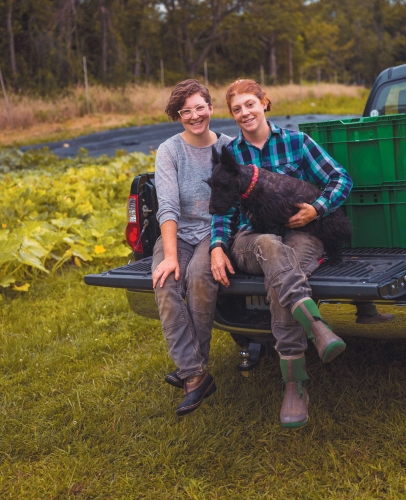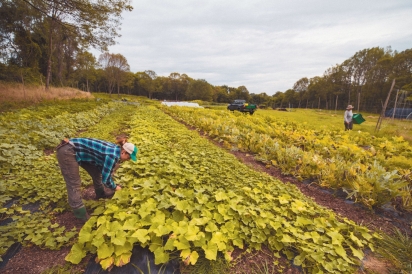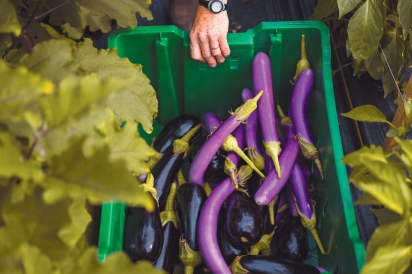Digging Dirt Down on the Farm
From the Back of the House to Tilling the Field, Two Chefs Cultivate a Farming Life
NOTE: Since the publishing of this story in 2018, Moonrose Farm has moved to Rehoboth, MA. Find them at MoonroseFarm.com.
Deep in suburban Cranston, close to the highway and the Warwick Mall, a greenhouse sits at the end of a cul de sac. Inside is Jax, a Scottish Terrier farm dog, and close behind him, Melissa Denmark and Jordan Goldsmith, partners, owners and operators of Moonrose Farm. Beyond the greenhouse the suburbs open up into no-till, chemical-free agricultural fields.
Melissa and Jordan are in their third season farming and in their second season on three acres of vegetables and flowers at Hurricane Hill, a historic farm owned by Drake Patten and Wright Deter, who also own Cluck!. In addition to moving their agriculture retail shop from Broadway in Providence to their Cranston farm this season, Patten and Deter are cultivating a female farmer incubator by parceling out pieces of their land to women who want to farm. Radia Herbs and Lucayda Farm are neighbors to the women at Moonrose.
Different than many new farmers, though, Melissa and Jordan’s journey to the land started in the kitchen. Having worked in restaurants since age 15, Melissa (now 29) followed her culinary path by studying pastry at Johnson & Wales. Soon after graduation she was hired at Gracie’s restaurant in Providence; now, she is the executive pastry chef at Gracie’s, as well as at its sister café, Ellie’s Bakery.
Culinary training for Jordan (age 28) began at home with her family and an abundant backyard garden. She spent five years as the chef at Garden Grille in Pawtucket and now works in the kitchen at Eli’s in Warren in the winter, saving the summer season to farm full-time. The two chefs were introduced by a mutual friend in the restaurant industry and were married in 2016.
The transition from kitchen to farm was a natural one for Melissa and Jordan, who interact with farmers daily as a result of back-door restaurant deliveries. “Getting to know farmers, I saw how life could be different than my restaurant life,” says Jordan, and she set out to try and make that change. An apprenticeship and employment at Scratch Farm, also in Cranston, put her in the right direction.
Several restaurant wholesale accounts and a 65-person community-supported agriculture (CSA) harvest subscription program are the bulk of Moonrose Farm’s business. With just one full-time farmer (Jordan), Moonrose relies heavily on the help of volunteers and CSA work shares, which they seem to have in abundance. Their connections to the restaurant industry help foster this—many of the hands that work their land also work in kitchens throughout the state.
Volunteers come regularly from the former North bakery in Providence, Bywater and Eli’s in Warren and other restaurants. The group works hard seeding, weeding or harvesting or whatever needs doing and breaks for a collaborative lunch with the best ingredients at their fingertips. There’s a lot of talk about food and cooking out in the field. “But most people are in it for the lunch,” says Melissa with a laugh.
“We feel we are bridging the gap between chefs and farmers,” says Jordan and everything seems to drive back to this point at Moonrose Farm. They are farming with the chef in mind. They are cooking with their land in mind.
Harvesting crops at various stages of growth is common at Moonrose, instead of letting everything grow to its “traditional” ripeness. Melissa and Jordan know what size and tenderness will be appealing to a chef and the nontraditional harvests that will push their creativity. For example, their garlic is harvested at its early green stage, when it’s similar to a scallion; as garlic scapes, which are immature flower blossoms; and as the mature bulb.
Chefs by nature are also great at repurposing and by spending time at the farm, volunteers get to practice this before crops even arrive to their kitchens as ingredients. With the help of Melissa and Jordan, they find great use of edibles like arugula flowers and flowering brassicas that most would see as undesirable, having already gone to seed. And when crops are busted or bruised, not pretty enough for the CSA, chefs will gladly take them home.
With their backgrounds, Melissa and Jordan are also ahead of the game when it comes to growing their restaurant accounts. They already know what chefs are looking for, what things should cost, how ingredients should be packaged and—probably most important—how to pique the interest of a new account by stopping by the kitchen at the right time and talking shop.
If cooking and farming were not enough to keep them busy, Melissa and Jordan are also founders of the new restaurant distribution service, New Roots Farmers Co-op. This is an online platform where chefs can order directly from farms for delivery. Currently the farms involved, Moonrose and Hocus Pocus, share the responsibility of delivery and administrative work.
Beyond food there are flowers, and no shortage of them. Jordan is experimenting with many different varieties that may be new to the average flower lover. Wholesale clients can purchase buckets of cut flowers and do their own arranging, an opportunity to encourage creativity and keep costs down for the buyer. (They are talking about flower arrangement classes for later in the season.)
While this farming duo may have their heads in the soil, they are trying not to “lose their identities as chefs,” they say. Melissa, still baking full-time at Gracie’s, comes to the farm every Friday before service to harvest. What she brings back to Providence ends up on the menu that night. Until the farm needs more of her attention, she will continue to juggle both projects. Jordan looks forward to winter and getting back on the line.
Growing and collaborating at Hurricane Hill plays a large part in what Moonrose has been able to accomplish and Melissa and Jordan are incredibly grateful for the support of their landlords. “[They match] hard work and determination with humor, passion, kindness and generosity. It is such an honor to watch Moonrose and the other resident farms ... create their unique visions while also being a crucial part of writing our historic farm’s new story,” says Patten.
The long-term plan for Moonrose is to put a restaurant on its own land that supports a farm café and chef-driven dinners at night. Jordan and Melissa realize there are many steps to get there and the growth will be gradual, but since the decision was made to start farming, says Jordan, “doors have opened up for us and we’ve walked through them.”
To learn more about CSA shares and flowers, visit MoonroseFarm.com.
To learn more about restaurant deliveries, visit NewRootsFarmersCoop.org.







